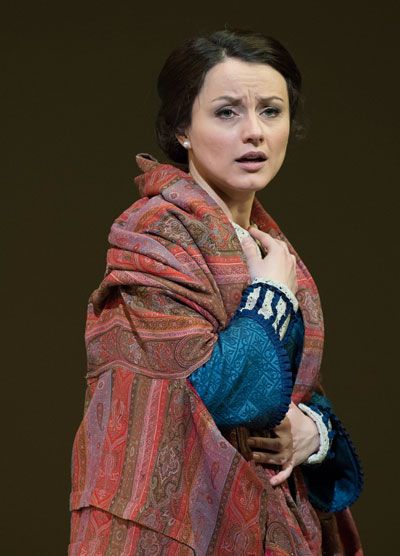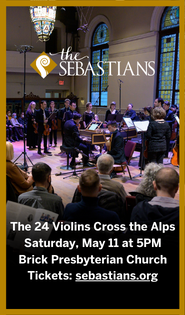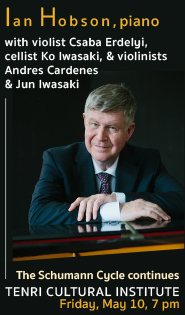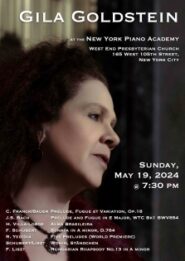Hartig leads a fine supporting cast as Met’s “Bohème” keeps rolling along
It might be assumed that Franco Zeffirelli’s monumental production of La bohème, having been presented by the Metropolitan Opera over 500 times, practically runs on autopilot.
Yet sets—even Zeffirelli’s epoch-making ones—don’t make the magic happen on their own accord. The music almost always does, especially with Puccini, and so it was on Sunday afternoon at the Met with a new cast of Bohemians.
The Met stayed with the tried and true in casting Anita Hartig as Mimi and Stephen Costello as Rodolfo. Hartig has had great success in the role and it is easy to understand why. Her soprano has the size to ride over the orchestra in Puccini’s arching melodies. Yet she can spin soft, luminous sounds. Her final “Senza rancor” at the close of Act III was absolutely beautiful.
Hartig is also a fine actress. In the first two acts her Mimi beamed with love and happiness. There was no indication that there might be something amiss with her health. When Mimi ventures to the Barrière d’Enfer, however, Hartig is wan and exhausted. Her every cough seems to be a death knell. Reunited with Rodolfo and her friends in the final scene, the dying seamstress briefly beams as she recalls the carefree days when they first met on Christmas Eve, before she silently slips away.
Seemingly earnest by nature, Costello is a serious Rodolfo. The tenor was in particularly fine voice for this performance, singing with exceptional elasticity and emotion. The ease with which he caressed and then lingered on the climatic phrase of “Che gelida manina” was particularly impressive.
Rodolfo’s flatmate Marcello was sung by Alexey Markov. Bitter irony is the default mode for these two frustrated artists. Markov’s dynamic baritone was at its most exciting when he was exchanging insults with the fiery Musetta of Heidi Stober.
Beautiful and statuesque, Stober is the center of attention at the Café Momus, where her Musetta is never malicious, just effervescent and willful. The soprano’s voice is equally commanding, whether taunting Marcello in “Quando m’en vo,” or praying for Mimi’s recovery in the final scene.
It’s fascinating how a single singer can tilt the balance of the ensemble. In the first cast, Adam Plachetka’s ebullient, larger than life Marcello anchored the four male Bohemians. With this cast, it was Krzysztof Bączyk’s Colline who served as the center, although in a very different way.
Bączyk is tall and although never trying too hard to be funny, he just is. His head-in-the-clouds Colline was entirely wrapped up in his own thoughts, which made the philosopher’s decision to part with cherished overcoat all the more poignant, as did the warmth in his bass voice.
Rodion Pogossov, with his sonorous baritone, was a lively, and alert Schaunard. Donald Maxwell, a holdover from the first cast, reprised his wonderful Benoit and Alcindoro.
The other constants on the musical side of the equation were the Met’s chorus and orchestra under the baton of Carlo Rizzi. Whether returning to the Met to enjoy your favorite opera, or someone experiencing it for the first time, Rizzi and his forces made this La bohème fresh and exciting. The Zeffirelli sets were just the icing on the cake.
La bohème runs through January 13. metopera.org






